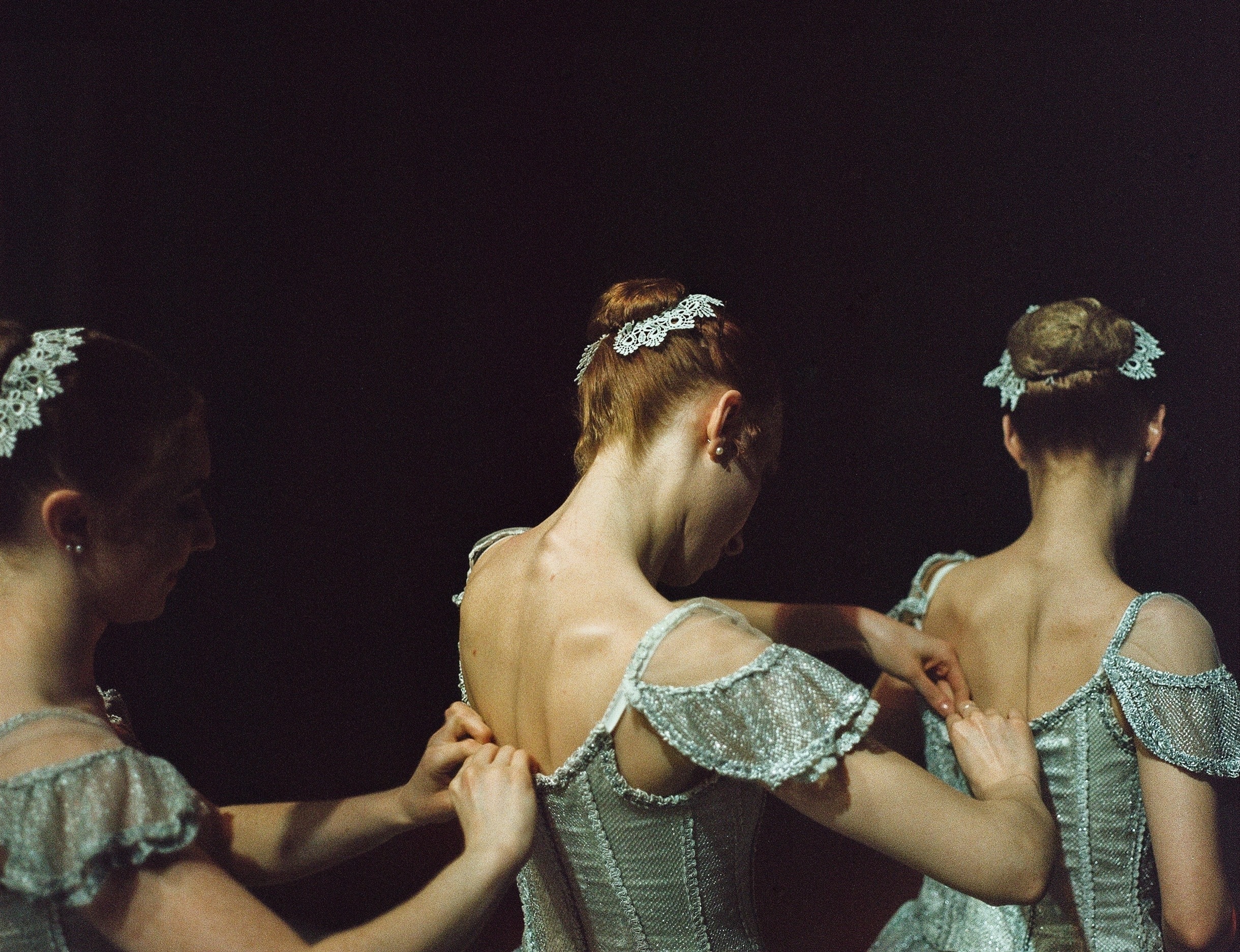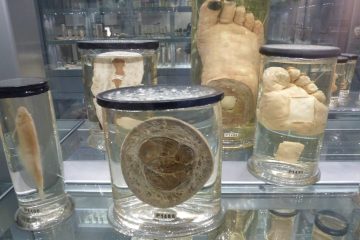
When COVID-19 first reached Europe and the lockdown began to tighten in the UK, I was shocked to see scenes of empty supermarket shelves and people panic buying. I heard that food banks – which are already strapped for vital supplies – were really struggling and I wanted to do something to help. So a group of friends and I started a print sale, with support from whynow, to bring the photo community together and support a good cause.
After putting out an open call with the theme of ‘Hope’, we received over 100 submissions from around the world. Here, we’ll be showcasing a selection of photographers who took part in the initiative, and sharing their personal reasons for hope.

Poppy French
Can you introduce yourself and tell us about your work and previous projects?
I’m Poppy. I like to work mainly on portraiture and documentary and I recently worked on a project for Vogue International shooting Ru Paul’s Drag Con, which was so fun. I always shoot on film and I love to use a variety of cameras and techniques. I also love to photograph at a seaside town and I’m really missing that at the moment, although I’ve got some great rolls from Gorleston-On-Sea shot just before lockdown waiting to be developed.
Why does your photo represent hope?
For me, it represents the hope of new life and all the feelings and thoughts that go along with that. Also, I feel it represents possibility and for me, there is so much hope in possibility. As the viewer of the image I think you can make up your own story of hope for what you see. There is no title, you don’t know who the woman in the picture is, where she is or who the baby is, or will be. What the image represents and the hope within it is up to you.
For me, it represents the hope of new life and all the feelings and thoughts that go along with that
How are you staying positive during lockdown?
I’ve spent a lot of time looking at Google Maps around where I live and wandering to new green spaces or streets that I haven’t visited before. I also love a Chinese takeaway or a kebab shop. They have the best signs and interiors, so I’ve been collecting photos of some great ones near me along the way.
I’ve taken strange inspiration from things, such as a run-over kiwi fruit I saw last week! I’m building up rolls of undeveloped film and I’m feeling excited about when I can get those developed and see what the last few months have looked like.

Hugh Fox
Can you introduce yourself and tell us about your work and previous projects?
I work commercially shooting portraits and documentary projects. I’m also a practicing artist and have a studio at the Phoenix Art Space in Brighton, UK, where I live with my wife and two kids.
In contrast to my commissioned work (that’s often studio-based or working to a tight brief), my personal work is a lot more intuitive and observational; I’m looking for narrative, light and beauty in the ordinary.
I’m currently working on a couple of long-term projects. One of these is Alice, a documentary-portrait series about a 98-year-old that lives alone in Paris. She has lived in the same apartment for over 60 years and I’ve been photographing and filming her daily life on and off for the last two years. I’ve also been recording interviews with her about her life, particularly her memories of her early 20s when she was an active member of the Resistance.
I’m proud of how our industry has pulled together to support one another, as well as using what we have to help other people and reflect this collective experience
Why does your photo represent hope?
This image is part of an ongoing collaborative series with American-Iranian artist Darvish Fakhr. The series is called Lightness of Being. Our work is a reaction to the head-down, fast-paced living we are becoming more and more accustomed to. If hope is an expectation or desire for a particular thing to happen – it’s our hope that in our daily lives, we can stop, afford ourselves the luxury of being present and in a fleeting moment, experience joy unto itself.
How are you staying positive during lockdown?
I’ve been staying sane during lockdown by having a routine of exercise, homeschooling my daughter, spending time in nature and creating at least one new image a day to post on Instagram – this has been an important part of documenting this time for me, as well as engaging with the photography community. I’m proud of how our industry has pulled together to support one another, as well as using what we have to help other people and reflect this collective experience. Time has gone quickly, but where I can I’ve also been working on refreshing my portfolio, project ideas and making new contacts to visit once lockdown is lifted.

Sam Mellish
Can you introduce yourself and tell us about your work and previous projects?
I’m a freelance photographer based in South London. My career began shooting editorial and brand photography for the action sports industry. This was off the back of some intensive travel during my 20s and 30s. Sport and documentary photography remain my core practice, and I try to balance the two as best I can.
Over the years, I’ve been awarded ‘Grant for the Arts’ from the Arts Council of England on three occasions and my work has been widely published and exhibited. A career highlight came when I was asked to document the 2018 PyeongChang Winter Olympics for GB Park & Pipe. I’ve since been working closely with Team GB on various commissions and assignments. As an afterthought, I’d say Roadside Britain is the work I’m most proud of.
I like to think the shadow cast from the statue pointing to the man represents freedom (of speech) to one and all
Why does your photo represent hope?
To me this image is the essence of freedom and liberty – and therefore hope. Captured at Broadcasting House, London in the summer of 2018, this shot shows George Orwell’s statue, inscribed with a quote from Animal Farm, “If liberty means anything at all, it means the right to tell people what they do not want to hear.” I like to think the shadow cast from the statue pointing to the man represents freedom (of speech) to one and all. I’m a big Orwell fan. I was first introduced to his book, Down And Out In Paris and London as a teenager when working as a plongeur at a local restaurant. I’ve read about half dozen of his other books, so to have this image in my archive is a real privilege – it’s one of my favourites.
How are you staying positive during lockdown?
[Laughs], it depends what day you ask me. Shortly after lockdown, my partner and I welcomed the arrival of two glorious twins, which marked the beginning of our own family. It goes without saying, the past five weeks have certainly been challenging, with limited sleep and a constant cycle of nappies to change, but every day they provide new joy. I can’t thank the NHS staff at St Thomas’ enough for looking after us all during early April. I’m also hopeful for the future – as a photographer there are often times of uncertainty, albeit much smaller and inconsequential in comparison, yet it’s important to remain positive when the chips are down. I’d like to think we can welcome a greener, more peaceful and slightly more united country than the one we have seen in the past few years. But one step at a time I’d say.

Jamie Sinclair
Can you introduce yourself and tell us about your work and previous projects?
I’m a photographic artist from Ashington, Northumberland, living and working in London. My personal work focuses on documentary photography, revealing intimate narratives which explore notions of emotive storytelling as an act of collaboration. I work on projects over extensive periods, aiming to create images that empower my subjects.
My most recent project Unrequited Love is shot over three years, documenting my partner Madeleine’s triumphs and struggles with her ballet career, whilst sharing similarly triumphant and struggling times with my own discipline. The project is set alongside her personal love letter to ballet – written as though to an abusive partner – which aims to give a new understanding to the series and seeks to create space where viewers can relate these hardships to that of their own. Unrequited Love has led me to develop a new project, using the letter as an extension of my subjects and as a form of primary research, while investigating gender equality framed through the lens of male dancers.
People still have dreams and goals throughout all of this and it is remindful that eventually we will be able to continue to fulfil them
Why does your photo represent hope?
‘The Costume Train’ is one of the key images from ‘Unrequited Love’ and was my first experience of handprinting in the darkroom. The photograph gives me hope as it depicts a classic “fairytale” dream being lived. People still have dreams and goals throughout all of this and it is remindful that eventually we will be able to continue to fulfil them.
How are you staying positive during lockdown?
I’ve found my best way to stay positive is to set aside at least an hour a day to do some focused work and try to not be too negative when things aren’t going at a break-neck pace. The whole lockdown experience has been surprisingly interesting for me; I’ve worked on a rapid response documentary commission in the early stages of the pandemic and was shortlisted for an award. I’ve been making the most of the many great photographers and organisations who have been hosting live instagram discussions and interviews.
I’ve also found this a great time to touch up on my researching skills by taking part in ‘Work, Show, Grow’ research workshops, which put me in good stead to begin researching my next project in great depths. Alongside this, I’ve had the opportunity to peer review my work with some very talented photographers and other industry professionals, due to the downtime we’re all currently experiencing.
All prints available to buy now from printsforfood.com until 31 May, with all profits going directly to The Trussell Trust, a charity with a nationwide network of more than 1,200 food banks.
View ‘Photographers in Support of UK Food Banks, Part 1’ here.




